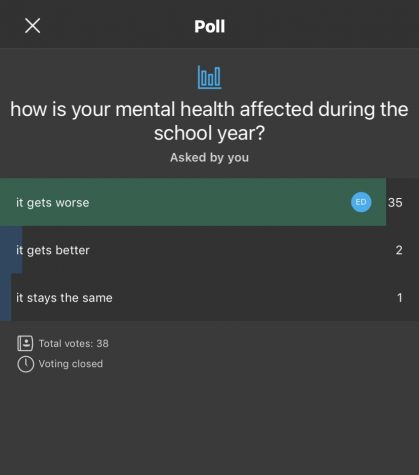Toxic positivity: does it harm or help?
September 22, 2021
Here at the Academy, there is pressure to be amongst the best of the best when considering high school academics. Far too often, intellectual competition, a busy schedule, and high expectations lead students to have a struggle with mental health throughout their lives. A contributor to the continuation of this issue includes promoting toxic positivity. While toxic positivity puts up the front of being helpful, it causes a threat to mental health by encouraging the dismissal of mental health issues. Rather than aiding a student’s mental health, toxic positivity masks the problem and excludes addressing the underlying problem, causing symptoms of negative mental health to worsen.
Many people at the Academy claim their mental health worsens during the school year due to pressure and busy schedules, as well as academic workload and expectations.

Elizabeth McCree (’22) said, “There tends to be a lot of pressure to exceed expectations, whether in or out of the classroom. There are also expectations that we do all of the work piled on us, and the knowledge that students are very busy outside of school doesn’t always seem to be taken into consideration. Usually, when we come to school stressed because of this, our emotions are sometimes dismissed. This has affected my mental health as I try to achieve unattainable goals while still prioritizing my mental health, and since the two do not complement each other well, I find myself prioritizing school as my mental health decreases.”
With the packed full schedules that many students have, burnout is a prominent problem. When it gets difficult to keep up and a student needs support and guidance, at times they are dismissed which aggravates the problem. Though there are attempts to help stressed out students, encouragement to take a deep breath or better manage time is not helpful or constructive. Rather, it would be a better use of time to aid students in developing coping mechanisms to navigate the issues that they are facing.
Universities: Need help? Use our mental health services!
The services:
-A golden retriever comes to the library once a week
-There's one therapist on the campus of 40,000 students
-There are bathroom stalls you can cry in for free!— Gabrielle Drolet (@gabrielledrolet) January 27, 2020
Sadly, a cute golden retriever is not sufficient to stabilize the mental health of someone who is struggling. A puppy may be a good distraction for a moment, however, it is less than useful when attempting to identify and solve downturns in a person’s mental health. While words of encouragement are a nice sentiment, those comments can many times fall under the promotion of toxic positivity, which is more harmful than helpful since it neglects to actually address the issue.
Jorja Solak (’22) said, “Toxic positivity is just pretending that everything is okay, when it actually isn’t, which is very counterintuitive. Actually taking the time to listen to someone’s problems and providing them with genuine advice goes much further than a mindless, dismissive comment.”
While actions may be intended to help, it is much more encouraging and constructive to teach healthy coping mechanisms and suggest taking time for oneself to just be, rather than suppressing emotions to succeed academically.
Something that may be helpful to those that are struggling is to have a safe space (such as a psychologist) to help them work through their problems and learn supplemental skills to work through a mental struggle, since many times it is overwhelming to work through mental health struggles alone.
History teacher Stacy Filocco shares thoughts on the importance of coping mechanisms: “For students who are being newly challenged with a particular workload, what we really want to focus on is helping them to develop a whole toolbox of skills that they can utilize in order to handle things like stress or pressure or nerves or feelings of anxiousness. When we gloss over those things or if we pretend like they don’t happen or if we look to highlighted reels on social media to provide guidance, what we are then missing is the opportunity to help and learn from each other so that we can develop those skills that will allow us to navigate challenging situations in the future.”

